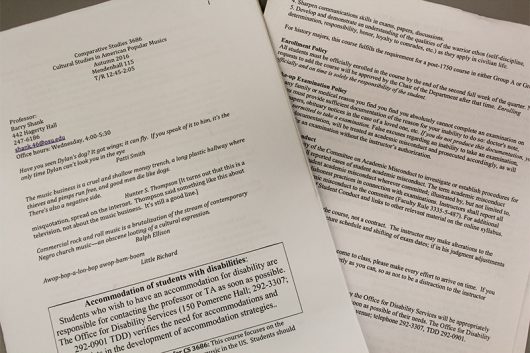
Undergraduate Student Government has been trying to get a mental-health statement on syllabi for more than two years. Credit: Mason Swires | Assistant Photo Editor
After years of bureaucratic failure regarding its creation and implementation, a mental-health statement will now be available for professors at Ohio State to include on their course syllabi.
The University Senate voted unanimously Thursday night to pass a resolution created by USG earlier this year requesting that professors incorporate a disclaimer on OSU’s mental-health resources at the bottom of each syllabus. Including the statement will not be mandatory.
The statement will include OSU’s Counseling and Consultation Service address, phone number and website, similar to the message included on syllabi from the Office of Student Life’s Disability Services. It was developed with the help of Micky Sharma, the director of CCS, in hopes that it would be a clear indicator of where and how students can access mental-health services on campus.
The Senate is a body of 137 members consisting of faculty, administration and students that authorize the legislative authority of university faculty over educational and academic policy. After voting on resolutions, full implementation can begin immediately.
“We need to take every action we can to make sure students feel like they can go and get the resources they need.” — Gerard Basalla, president, Undergraduate Student Government
Professors are typically emailed with a reminder of what to put on course syllabi, and the mental-health disclaimer will be added to the checklist in time for Spring Semester, said Michael Frank, a third-year in political science and the USG senator who sponsored the resolution.
“The syllabus is your path to success in a class,” Frank said earlier in the semester when USG passed the resolution. “If you want to be able to succeed in it, you need to follow what’s in the syllabus and whether that’s test dates or resources are available for you, so why should mental health be treated any differently?”

Undergraduate Student Government senators present their mental-health statement resolution to the University Senate Credit: Courtesy of Gerard Basalla
The development of the mental-health statement for syllabi began more than two years ago in USG, and three resolutions regarding its implementation have been created during that time. However, the first two tries resulted in the draft expiring at the end of the academic semester.
Frank presented the resolution to University Senate alongside Sam Whipple, a fourth-year in political science and economics and the chairman of USG’s Undergraduate Caucus.
Resolutions created and authored by students alone are not commonly reviewed by University Senate, Frank said Thursday night. Typically, USG co-sponsors resolutions backed by faculty or other non-student organizations.
He guessed that passing something like this has not been done by the chamber in decades, or perhaps ever.
Gerard Basalla, president of USG and a fourth-year in political science and strategic communication, said he’s hopeful that many professors will end up including the statement next semester.
“Mental health matters at Ohio State. You matter,” Basalla said. “We need to take every action we can to make sure students feel like they can go and get the resources they need.”
Frank said he hopes the new disclaimer will help destigmatize mental health on campus, resulting in a more accepting campus for students who have mental-health issues.
“The university is concerned about student’s well-being, and we are especially concerned about mental health,” he said.


